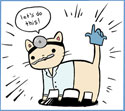|
Yep, we did MMI here, too. It was definitely terrifying going in, but I liked it overall. We were basically interviewed by 12 (I think?) different people, which I think helps a lot in case one interviewer just randomly decides they despise the shape of your nose or whatever. And if you bomb one station, you can just suck it up and move on. I definitely bombed one, and looking back I think I must have misread the scenario because it didn't make any sense. With traditional interviews (which I never did, so correct me if I'm wrong), it seems like most schools ask a lot of the same questions, so you can pretty much memorize and practice your delivery of "Tell us about yourself" or "Why veterinary medicine?". I don't think rehearsed responses are nearly as revealing of a candidate as putting them on the spot and making them articulate their ethical standpoint on something controversial or complex. They're supposedly adding a timed essay to the interviews here in the near future. I'm glad we didn't have to do that because my writing is a disorganized mess when I'm timed (GRE writing
|
|
|
|

|
| # ? Apr 25, 2024 07:33 |
|
Crooked Booty posted:With traditional interviews (which I never did, so correct me if I'm wrong), it seems like most schools ask a lot of the same questions, so you can pretty much memorize and practice your delivery of "Tell us about yourself" or "Why veterinary medicine?". I don't think rehearsed responses are nearly as revealing of a candidate as putting them on the spot and making them articulate their ethical standpoint on something controversial or complex. I had a traditional interview and it wasn't all formulaic. The questions followed whatever answers I gave, so it was very tailored to my interests and experience. We got off on a huge tangent about legislation and client education/communication that was a lot of fun. I haven't done MMI, but I can't imagine any of the 12 interviewers learning as much about what I stand for and how I work as in the traditional interview. I guess the year before I applied went horribly wrong in some way, because the entire school acknowledges that the class of 2013 is a collective rear end. It's pretty weird to have an entire class be complained about by practically every professor.
|
|
|
|
I am in the last class to be interviewed in a traditional manner. I was interviewed by two lecturers - one endocrinologist (non-vet) and a veterinary radiologist. When I walked in they had my personal statement sitting infront of them with highlights and annotations. I was very pleased/terrified because my mentor and I had spent ages working on my personal statement. They made me an offer on the spot right after the interview. (It was the only school out of 13 I even got an interview from let alone an acceptance so not that slick hehe). My school now does the multiple interviews and apparently some are group. The class sizes over here are a lot bigger so that is their reason for multiple interviewees. One station that will have a skull on display and ask what you can tell about it - carnivore/herbivore/omnivore etc and perhaps lifestyle. I am not sure about that others. I was very glad for the traditional approach because the interviewers got to build upon my previous answers. They asked me ethical questions and asked for further explanation of my personal statement, as well as what I wanted to do with a vet med degree. As for PBL, here is an example of a rather lengthy activity did with our exotics dude. We had a few hours scheduled for this but you do not have to stay the whole time or even show up. quote:
|
|
|
|
Asstro Van posted:I had a traditional interview and it wasn't all formulaic. Same with me. Comparing the two, once I read the scenario and the questions I knew that's what I had to work with, and they were generally predictable questions for the situation. The panel interview definitely had the questions that threw me for a loop because sometimes they'd be very out there. YourCreation posted:I am in the last class to be interviewed in a traditional manner. I was interviewed by two lecturers - one endocrinologist (non-vet) and a veterinary radiologist. When I walked in they had my personal statement sitting infront of them with highlights and annotations. I was very pleased/terrified because my mentor and I had spent ages working on my personal statement. They made me an offer on the spot right after the interview. Our panel had 3 - all vets, but 2 were faculty from the college, and the other was a veterinarian practicing in your province. They also always make every acceptance offer in mid-June, and usually done as close as they can to when UCVM makes their acceptance offers. When UCVM first started, because they did MMIs they could send out acceptances earlier, whereas WCVM usually didn't finish interviews until early June, and there was apparently some pressuring of applicants to accept their offer so now both schools send everything out in the same week. Oh, politics. It's also interesting in that UCVM, which has the MMI format, is the one with the smallest class size (30). They had a hands-on station as well where you had to put your hands in a box and do things, I guess to test your dexterity when you can't see them (e.g. C-section). On a topic not interview-related... there's been something that's been really bothering me. There is a really widely-held notion in PI and on the Internet in general that Hartz products are dangerous to cats. Everyone else has learned that pyrethrins are really safe and it's only permethrins that are dangerous to cats, right? And that permethrins are only in the dog formulations, and not the cat formulations? My pharm prof said pyrethrins are so safe, pretty much the only way you can injure an animal with it is to physically hit it with the box. But in PI people always say that Hartz flea products, even if labelled for cats, is bad for cats, and no one has ever really said anything to the contrary, so I believed for a really long time that this was true. I asked my prof about this discrepancy, and she said it was probably people just accidentally (or intentionally) using the dog formulation, or they give the dog stuff to their dog but then the cat rubs against the dog and it causes toxicity that way. I'm not crazy though, right? Has anyone else noticed this?
|
|
|
|
You're not crazy, it's the dog formulation, it's just that Hartz doesn't mark the packages that well so people freak out.
|
|
|
|
Braki posted:On a topic not interview-related... there's been something that's been really bothering me. There is a really widely-held notion in PI and on the Internet in general that Hartz products are dangerous to cats. Everyone else has learned that pyrethrins are really safe and it's only permethrins that are dangerous to cats, right? And that permethrins are only in the dog formulations, and not the cat formulations? My pharm prof said pyrethrins are so safe, pretty much the only way you can injure an animal with it is to physically hit it with the box. But in PI people always say that Hartz flea products, even if labelled for cats, is bad for cats, and no one has ever really said anything to the contrary, so I believed for a really long time that this was true. I asked my prof about this discrepancy, and she said it was probably people just accidentally (or intentionally) using the dog formulation, or they give the dog stuff to their dog but then the cat rubs against the dog and it causes toxicity that way. I'm not crazy though, right? Has anyone else noticed this? I had an argument on Facebook with some cat lady about this exact thing. People were reposting this inflammatory thing about not buying cat flea products from the supermarket because they contain pyrethrin which is toxic to cats!! Even though it's not. I tried to explain that it was the synthetic variants but these people had it in their heads that pyrethrin is toxic and big pharm doesn't want people to know.
|
|
|
|
So, has anyone here been hit on by clients? Any fun stories? I played safety buddy for a resident. I was sitting in the rounds room for the rotation and he comes in and asks me to come in to the room with him and the client during discharge - "I need you there so that a legal case can be made if anything happens." Unfortunately, I was not there for the walk to the front desk. He thought it was safe at that point - he was wrong. She grabbed his rear end. I was also walking the client to the front desk for my experience. Client looks at me and says:  Oh to be young again... I would be all over you. (she was around 40 years older than me) Oh to be young again... I would be all over you. (she was around 40 years older than me) Um... thanks... (I start walking faster to get into the next hallway where I can see people) Um... thanks... (I start walking faster to get into the next hallway where I can see people)She goes on about it until we get into that next hallway... the only part I really remember was the last line: "Oh, that was probably all sexual harassment, wasn't it?" Yes, yes it was.
|
|
|
|
Today Topoisomerase and I fisted cows. I can't say I felt all the things we were theoretically supposed to and it was scary to dive in (basically literally) and just do it, but it was still awesome and I know I'll get better with practice. LIVING THE DREAM.
|
|
|
|
Enelrahc posted:Today Topoisomerase and I fisted cows. I can't say I felt all the things we were theoretically supposed to and it was scary to dive in (basically literally) and just do it, but it was still awesome and I know I'll get better with practice. LIVING THE DREAM. I can truthfully say I did this once for the experience, then promptly decided I was never going to do it again. Thank god for optional labs.
|
|
|
|
Solis posted:I can truthfully say I did this once for the experience, then promptly decided I was never going to do it again. Thank god for optional labs. It's an elective for us too. I figured my vet school experience was not complete without this time honored tradition.
|
|
|
|
Topoisomerase posted:It's an elective for us too. I figured my vet school experience was not complete without this time honored tradition. Every vet should have to do this, if only to have more respect for people who don't suck at it.  After a while, I could just barely get to the point where I could figure out what was the uterus. Still, helps keep the arms warm in winter. Worst lab? Learning how to "collect" dog semen. Those were, however, the happiest beagles on the planet - it was disturbing how they started wagging as soon as they got into the room the lab was in.
|
|
|
|
Those beagles probably thought you were the best people anywhere. One of our Internal Medicine faculty had a great quote about repro: "I spent 8 years of college, several years of practice, and 3 years of residency to earn all these letters after my name... and I have to jack off a Pekingese?"
|
|
|
|
Solis posted:I can truthfully say I did this once for the experience, then promptly decided I was never going to do it again. Thank god for optional labs. It's optional for you guys? It is mandatory for us. Also, every year our anatomy professor gives a demonstration to the first years on, uh... how to collect dog semen. Well, he mostly does it to show us the anatomy of a dog's penis. It is so awkward. He used one of the dogs at the college, and he was way too nervous, so it didn't work, and the prof was like, "Before I got him neutered, I used my dog, and he finished every year!"
|
|
|
|
Khelmar posted:
There is nothing worse than waking up at 4 in the morning, in the freezing cold, and realizing that your only hope of shelter is up a cow's butt.
|
|
|
|
Ours was the first year it was optional, and we didn't have to do semen collection at all except as a theoretical (thank god)
|
|
|
|
At my work experience today we did cherry eye surgery on a bulldog. I think I've mentioned it before, he came in a couple of months ago, vomited on induction and was very close to dying. So they didn't do the surgery. Nothing to do with the owner as he had been fasted as per normal. Today they did surgery successfully and the dog vomited after. He'd been fasted for almost 3 full days! Also looked like he had mange. This dog was a mess. Has anyone heard of this before? Could it have a bowel obstruction or something like that? The vomit was brown and runny. Last time after fasting for about 14 hours it still had visible kibble in it.
|
|
|
|
6-Ethyl Bearcat posted:At my work experience today we did cherry eye surgery on a bulldog. I think I've mentioned it before, he came in a couple of months ago, vomited on induction and was very close to dying. So they didn't do the surgery. Nothing to do with the owner as he had been fasted as per normal. What do you induce/pre-med with? Does he have clinical signs at home? It'd be a bit weird for an obstruction to only show itself at surgery. He's a bulldog - could have a hiatal hernia or something like that.
|
|
|
|
6-Ethyl Bearcat posted:At my work experience today we did cherry eye surgery on a bulldog. I think I've mentioned it before, he came in a couple of months ago, vomited on induction and was very close to dying. So they didn't do the surgery. Nothing to do with the owner as he had been fasted as per normal. After 14 hours you can still get food in it... Gastric emptying isn't really a perfect process and sometimes it takes a lot longer than you would think. In my experience, after an overnight fast it's still not unusual to have an animal regurg intraop with food particles; we had a few of those with our surgery beagles this year after a 12 hour fast. If he'd had food particles after 3 days then that's kind of worrying but it's not like post-op vomiting is an uncommon thing, and brown runny liquid could just be glandular secretions + residual crud in the stomach/duodenum. Bulldogs in particular are notorious for aspirating on recovery just because their airway is so horrible.
|
|
|
|
HelloSailorSign posted:What do you induce/pre-med with? Pre-med was ACP and methadone. I think they induced with alfaxalone. He wasn't showing any clinical signs at home. I noticed before I left that his cage card said fasting for surgery again today, so it looks like they're going to investigate... Thanks Solis, it's helpful to get other people's experiences. Things that happen in practice don't always line up with what we've learnt in class. Dogs like this make me paranoid, and I would never get a bracy breed after all the dramas we see.  He was definitely glad to have the ET tube and kept it in for ages after he woke up. First good breath he's had in years probably.
|
|
|
|
6-Ethyl Bearcat posted:He was definitely glad to have the ET tube and kept it in for ages after he woke up. First good breath he's had in years probably. Hehe yeah, we had a Pug that happily kept his E-tube in post-op for ages. He was walking around with it and I think would have gladly gone home with it still in. 
|
|
|
|
That picture is cute and tragic at the same time.
|
|
|
|
Being intubated was the first time my dog could actually breathe.
|
|
|
|
Our anaesthetists at school always say that you should wait till brachy dogs are pretty much chewing on the tube before they get extubated both because of the aspiration risk and to just help them breathe/recover better. Never seen one of them running around with it in though! Poor guy...
|
|
|
|
Christ, that's depressing 
|
|
|
|
That pug picture is the best. But also reaffirming that I never want a brachycephalic breed. Or you know, maybe because I don't want to deal with constant malassezia skin infections.
|
|
|
|
Request for some honest input! If I were to undergo Penn-Foster's vet assistant course, is that really on the same level as a diploma from a brick and mortar school?
|
|
|
|
Official Bizness posted:Request for some honest input! If I were to undergo Penn-Foster's vet assistant course, is that really on the same level as a diploma from a brick and mortar school? What is it, an online degree or something...?
|
|
|
|
Yep, online college.
|
|
|
|
I can't see an online course being anywhere near as good as a program with hands on experience... There's just so many skills a tech needs that require actually doing them to learn. That's just my opinion though, I obviously haven't dealt with anyone who's gone through that particular course.
|
|
|
|
Solis posted:I can't see an online course being anywhere near as good as a program with hands on experience... There's just so many skills a tech needs that require actually doing them to learn. That's just my opinion though, I obviously haven't dealt with anyone who's gone through that particular course. The people I know who have done online courses have been people who were already working at vet clinics as (unlicensed) assistants doing most of the hands-on stuff when they started. I could see an online program being beneficial for someone like that. But for somebody starting from scratch...ehh....
|
|
|
|
Topoisomerase posted:The people I know who have done online courses have been people who were already working at vet clinics as (unlicensed) assistants doing most of the hands-on stuff when they started. I could see an online program being beneficial for someone like that. But for somebody starting from scratch...ehh.... Seconded. I know someone who is planning on doing an online course because she has been working in a clinic for somewhere over five years but lives in the middle of nowhere, without access to a tech school. The program she was looking at also required her to do certain tasks and have the vet sign off that she did them successfully. That was for being a tech, not an assistant though. My super biased probably uninformed opinion is that a lot of an assistant's job is "go do this for me," which you are better prepared for by doing things than by solely reading stuff.
|
|
|
|
Asstro Van posted:Seconded. I know someone who is planning on doing an online course because she has been working in a clinic for somewhere over five years but lives in the middle of nowhere, without access to a tech school. The program she was looking at also required her to do certain tasks and have the vet sign off that she did them successfully. That was for being a tech, not an assistant though. oohhh, I can't read words - the poster was asking about an "assistant" course and I was totally jumping to assuming it was a technician course. Yeah, I don't really get the utility of an online course for an "assistant" certification. Honestly, I'm not sure I even get the utility of a certification as an assistant at all. Though CA is taking some initiative involving certification of assistants as "technician assistants" mostly from what I can tell.
|
|
|
|
Ok I figure this is place to ask. I've finally decided that I wanna bet a vet, I've tried so many other things animals have always been my calling, there's just something about them and me that I can't quite put my finger on. That said, what does it take? I recall hearing that vet school itself is harder to get into that regular medical school, what sort of classes would I need to take in college? I know it requires an enormous time commitment and I can give that, I simply wish to know other details. I also live in Puerto Rico and know nothing about any vet schools here, so which one is good in the states if it came to that, I see UCdavis being tossed around a lot in this thread. I would appreciate any honest answers you guys can give me.
|
|
|
|
I would recommend first looking at which schools you'd be looking at getting into. Here is a list of the accredited schools by the AAVMC: http://www.aavmc.org/Students-Applicants-and-Advisors/Veterinary-Medical-College-Application-Service.aspx The "General Info Chart" under School Information has basic application information for each school, while "Accreditation and Licensure" under Before Applying is more focused on their location. Once you have an idea of the school, find that school's website and see what their requirements are. Although there are many prerequisites that overlap (Chemistry, Biology, etc.), some schools may require a few different classes. As far as the US goes, there really isn't a "bad" vet school. Some are more well known than others, but some are really good in one area compared to other areas. A big factor in choosing a vet school is to see if they have a good program for what you're interested in. Say, if you're big about helping sea turtles (and want to work with them when you grow up), make sure they have programs or access to things like that. Some vet schools use different methods of teaching. Try and find out what they are and make sure they jive with you. Also check out the city and location - are you a big city person, or do you prefer rural? Would you pull your hair out on the plains, or would you hate driving downtown?
|
|
|
|
Oh, to see the younger classes taking on the media via Facebook... you guys make me so proud. Also so entertained. FIGHT ON, YOU.
|
|
|
|
HelloSailorSign posted:Oh, to see the younger classes taking on the media via Facebook... you guys make me so proud. Explain
|
|
|
|
YourCreation posted:Explain Purina OM recalls food. News reports it. Group on Facebook posts link with comment, "Yet another recall this one for low nutrition which can only happen with foods that don't have real meats" Underclassfolks go on to explain where thiamine is found in foods. There were a few other comments made that on their own weren't any "ZING" moments (regarding taurine and nutrient utilization), but opened up holes in the arguments by the Facebook group. At that point, however, people stopped posting.
|
|
|
|
HelloSailorSign posted:Underclassfolks go on to explain where thiamine is found in foods. There were a few other comments made that on their own weren't any "ZING" moments (regarding taurine and nutrient utilization), but opened up holes in the arguments by the Facebook group. At that point, however, people stopped posting. Yeah, I gave up.
|
|
|
|
Topoisomerase posted:Yeah, I gave up. To be fair, they had irrefutable evidence from a google search that you were wrong 
|
|
|
|

|
| # ? Apr 25, 2024 07:33 |
|
Topoisomerase posted:Yeah, I gave up. You gave it a valiant effort!  I thought about jumping in there when the person blamed the diet that's known to not be balanced and not for long term use on making their cat nutrient deficient... no duh. Then I realized that if I popped in, there would be a lot of vet students and they could take the "well you've been bought out so your opinion doesn't mean anything" and so I stayed out.
|
|
|


















